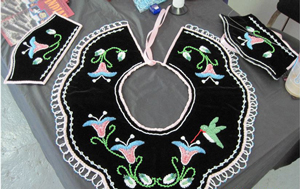



The Native American Student Union (NASU) at Fredonia will host Native American History month, featuring more than a half-dozen educational and enrichment events for the campus and community throughout November, to celebrate Native American history and culture.
Lisa Marie Anselmi, an archaeologist and chair of the Department of Anthropology at SUNY Buffalo State, will deliver the opening address, “Indigenous Stereotypes: Past and Present,” on Tuesday, Nov. 4, at 6 p.m. at the Horizon Room in the Williams Center.
In her talk, Dr. Anselmi will draw upon familiar stereotypes – Indian princess, aggressive drunk, the wise and ecologically minded elder and fierce warrior – that remain prevalent in popular culture. She explains the creation of these and other indigenous stereotypes during the Colonial period (1540-1789) and tracks their use by the public as well as government entities in the United States and Canada through successive time periods.
Building on the independent work of scholars such as Devon Mihesua, former editor of American Indian Quarterly, and Martin Reinhardt, assistant professor of Native American Studies at Northern Michigan University, Anselmi will argue that Indigenous stereotypes have intentionally been used through time to extract resources from Indigenous community control.
Anselmi, who also serves as coordinator for the Indigenous Studies minor, conducts investigations that highlight Indigenous people’s use of copper-based metals and faunal and floral resources of the Great Lakes region. Her talk, co-sponsored by the Ethnic Studies Speaker Series, is free and open to the public. Light refreshments will be served.
A forum addressing domestic violence and sexual assault against Native American women will be led by Brian Mohr, a deputy sheriff in Erie County who is of Seneca ancestry, on Thursday, Nov. 6, from 6:30 to 8:30 p.m. at McEwen Hall Room G-26. Mr. Mohr will also display a replica of the Women’s Nomination Belt, which represents the position and roles of women in Haudenosaunee culture. A presentation by Fredonia’s Counseling Center will acquaint audience members with some of the best ways to address, respond to, and support friends or family members struggling with domestic violence. The program, co-sponsored by the Women’s Student Union, is free and open to the public. Light refreshments will be served.
| |
| Samantha Jacobs' bead-work |
 |
| Mary Jacobs' bead-work |
A bead-working seminar, led by Mary and Samantha Jacobs, of Seneca and Turtle clan ancestry, will introduce the meaning of and basic skills involved with this art on Monday, Nov. 10, from 6 to 8 p.m., at Williams Center Room S204-D. The program is free and open to the public.
“I started learning from my grandmother as a teenager and have continued to learn new techniques from the elders in my community,” Ms. Jacobs explained. “Most of my creations are wearable and reflect the world I live in.” Jacobs makes art as a way to reflect the world around her in a self-expressive and visually appeal way. “No matter what the subject of a piece deals with, whether it’s a random flower or leaf that caught my eye or a particularly interesting story I’ve heard along my travels, my completed work is always about telling a story,” she explained.
A seminar on cornhusk doll making, led by Bernadette Franklin and Marcy Kane, both Seneca, Deer clan ancestry, will be held on Wednesday, Nov. 12, 5 to 7 p.m., at Williams Center Room S204-E. According to Antoinette Scott’s, “Legend of the Seneca No-Faced Cornhusk Doll,” the art form is used to teach children to value the unique gifts that the Creator has given to each individual; whether to teach or to be a care giver, a leader in the community or a committed worker. “The cornhusk doll teaches us to be humble and to treat others with kindness and compassion. The Seneca No-Faced Cornhusk Doll is meant to also teach us that it is not the outer beauty that matters; it is the inner beauty that the Creator sees and truly cares about. A lesson of vanity,” the elders said. Materials will be provided for the program, which is free and open to the public.
A showcase of a variety of cultures will be exhibited at Culturefest on Monday, Nov. 17, to celebrate the reinvigoration of NASU and Native American History Month at Fredonia. More information will be made available by the Multicultural Affairs Advisory Board, which is sponsoring the showcase.
A “Cranston Thanksgiving,” a joint presentation of traditional Native American dishes by NASU and the Faculty Student Association, will be held on Tuesday, Nov. 18, at Cranston Marche. Usual charges for meals will apply.
The documentary, “Unseen Tears: The Impact of Native American Residential Boarding Schools in Western New York” will be shown on Wednesday, Nov. 19, at 7 p.m., in Williams Center Room S204-ABC. In the film, survivors of the Thomas Indian School and Mohawk Institute, two Native American boarding schools in Western New York, tell their stories of traumatic separation from their families, abuse and a systematic assault on their language and culture. "When we used our language, they would wash our mouths with soap. They would throw us into a cold shower and beat us along the way,” said Elliot Tallchief, who was sent to Thomas Indian School when he was 5 years old. The documentary also emphasizes attempts by local communities to overcome the trauma resulting from the boarding school experience. The screening, free and open to the public, will be prefaced by comments from June Crouse Jones and Dwayne Sylvester, who will share their own boarding school experiences. Traditional shinnecock fry bread will be served.
The closing ceremony for Native American History month will be held on Wednesday, Dec. 3. More information on the final program will be announced in the near future.